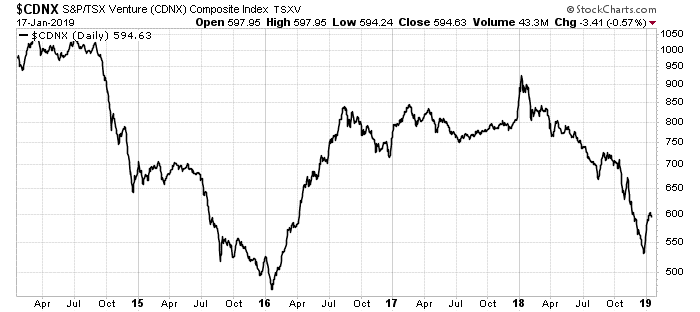“It’s rough,” the CEO of a junior mining company confided to me on the phone this week.
“We haven’t taken a paycheck in months, Matt.”
He chuckled. “It’s hard to get any attention from brokers and investors these days.”
Luckily, his company had a big win not too long ago.
It has plenty of cash in the bank to tide it over — but many companies aren’t so lucky.
The chart below shows the Toronto Stock Exchange Venture Index (TSX-V).
That’s basically the Dow Jones Industrial Average for junior mining companies.
Let’s Take a Look

As you can see, it just hit its lowest point in nearly three years.
As the share price above shows, investors sold mining stocks all through 2018.
The index fell 42% in 2018.
Junior mining companies are like small biotech or engineering firms.
They don’t make anything to sell, so they have no revenue.
The only way they can raise money is to issue new shares. But in a bad market, like we’ve seen lately, that’s difficult.
So, companies must tighten their belts to survive down markets.
What’s Next for Junior Mining Shares?
I did some analysis on the Canadian stock exchanges. They’re home to many of the world’s small-cap mining companies.
I looked at about 340 companies between C$10 million and C$1 billion in market value. None of them have revenue.
I compared the cash that they have on hand with the amount they spent on general and administrative costs (“SG&A” in their financial statements).
These include salaries, rent and marketing costs.
I found that 22% — 75 companies — don’t have enough cash to cover their SG&A costs.
There are some high-profile names on this list, as you can see in the table below:

This is an added risk for mining investors today.
Companies that need cash must sell shares to raise money. That means dilution for existing investors.
To issue more shares, the existing shares become worth less than before.
So, if a company adds 10% to its share count, all the existing shares fall in value by 10%.
What’s worse is that the share prices are much lower than a year ago.
It takes more shares to raise the same amount of cash. So, the dilution will be worse.
Companies like my friend’s, that have enough cash, can hold out without diluting shareholders. But many companies can’t.
If you own shares of mining companies, you need to know if they must raise money.
It may be worth it to get out now and get back in later, after the dilution is priced in.
Good investing,

Matt Badiali
Editor, Real Wealth Strategist




